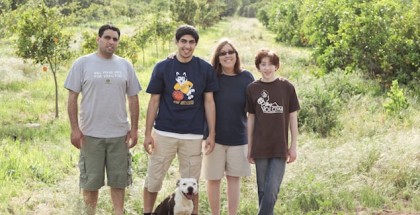Conference News
For Riverside, CA Food Co-op ‘Local is Micro-local’
May 31, 2016 | AJ Hughes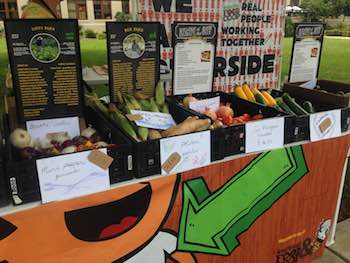
Al Centro mini produce stand, operated by the Riverside Food Co-op, provides locally-grown fruits and vegetables to Riverside residents. (photo courtesy Alannah Leblanc/Riverside Food Co-op)
The most important word for the Riverside Food Co-op (RFC) is “local.” Its definition can be broad, but for Nick Melquiades, RFC core team operations manager, “local” has a very specific meaning.
“For us, local is micro-local,” Melquiades says. “Ninety-five percent of our produce comes from within 25 miles of downtown Riverside.”
The RFC formed in 2011 in response to the recession in Riverside, has eventual plans to open a store. Not having a physical retail location to sell local produce, however, has not prevented it from playing an outsize role in local food system development in the City of Riverside. Read More
Ontario Community Garden Offers Hope and Health to Neighborhood in Need
May 24, 2016 | Anne Meyer Byler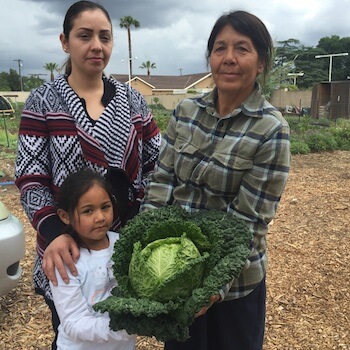
Photo Courtesy of Huerta del Valle Community Garden.
Huerta del Valle Community Garden is a thriving community garden that offers hope and a source of fresh, healthy produce to residents of an Ontario neighborhood struggling with high concentrations of poverty, obesity and food access.
The garden took shape in 2010 when former Pitzer student Morgan Bennett organized local community members to create a garden on the site of a former elementary school. Today, 62 area families have plots in the garden and often sell the wide variety produce that they grow to community members.
Arthur Levine, who currently works as farm manager at Huerta del Valle Community Garden, would like to see the community garden model that has been established here replicated.
“Our interest would be to see that the whole city has gardens like this one,” says Levine. “We want to see one garden every mile. Each garden would be part of everyone’s life in some way.” Read More
On Land Once Owned by University of California, Riverside, UCR Student Launches Avocado and Citrus Venture
May 19, 2016 | Anne Meyer Byler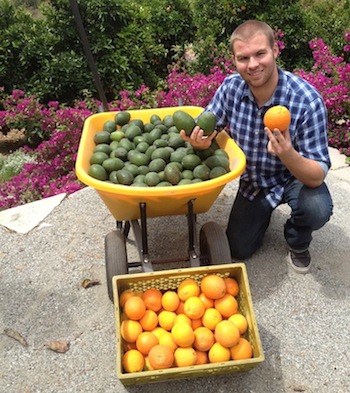
MIchael Johnson of Coronet Corner Grove in Riverside, CA with avocados and citrus that he grows and sells at the local farmers market, to the Riverside Food Co-op and through other local outlets. (Photo courtesy of Michael Johnson).
On agricultural land once used by the University of California, Riverside (UCR) for the development of the hybrid Gwen Avocado, Michael Johnson, a student who coincidentally happens to be attending UCR, has launched a burgeoning local food and farming venture.
Johnson has since rechristened the two acre plot of land, which his father purchased from UCR in 1995 as ‘Coronet Corner Grove.’
As a kid, he grew up working and playing on the farm land to which his father added oranges, grapefruits, lemons, limes, kumquats and loquats to complement the avocados already growing there.
The farm slowly became a part of him and in 2012, when he was just 18, Johnson saw an opportunity to take advantage of the growing demand for local produce and create an economically viable farming enterprise. So, he launched ‘Coronet Corner Grove’ and began handing out business cards and selling his produce at the Riverside Certified Farmers’ Market. Read More
Crowdfunding Tomatoes: Technology Platform Allows Consumers to Fund Produce
May 12, 2016 | Abbie Stutzer
ProduceRun stand. Photo courtesy of ProduceRun.
William Pattison, co-founder and president of ProduceRun, a web-based service that allows farmers to “pre-sell” goods to local consumers via a crowdfunding-like platform, is no stranger to farming. His family has worked the land for four generations.
“ProduceRun started on our own family farm,” Pattison says. “We wanted a better way to be found, sell and distribute our farm products to the public. I feel that our technology can make a real difference for farmers, making it easier for them to do business, and creating easier access for buyers.” Read More
It’s Almost Summer in the Urban Garden: Tips for Planting Hot Weather Crops
May 11, 2016 | Khristopher Flack
Zucchini. Source: Wikipedia.
It’s almost summer, and for many that means it’s time to plant the vegetable garden.
Of course, you may have put many of your plants in the ground already, but for those who like to put their vegetable garden in all at once, mid-May is often the time to do it.
The changing climate has complicated this somewhat, so gardeners in northern areas may need to wait until June to put in hot-season crops. This is particularly the case in cities where the city center may experience a several degree differential from surrounding areas. due to an urban heat island effect Check your local USDA zone map to see where you are..
Most summer crops discussed will not tolerate a frost, let alone a freeze, although a blanket on a cold night or row cover will provide a few degrees of protection. Read More
Despite Current Dysfunction in the Food System, Renowned Agroecology Expert Holds Out Hope for Future
May 10, 2016 | AJ Hughes
Stephen R. Gliessman, Alfred E. Heller Professor of Agroecology in UC Santa Cruz’s Environmental Studies Department, shares his thoughts regarding the state of the food system. Photo courtesy University of California, Santa Cruz
What is the state of the nation’s food system? Is it fundamentally broken and beyond repair? Does it need to be changed, and if so, how? What is it doing right?
To address these questions, we reached out to Stephen R. Gliessman, an internationally recognized leader in the field of agroecology, and the Alfred E. Heller Professor of Agroecology in UC Santa Cruz’s Environmental Studies Department, where he has taught since 1981. He was the founding director of the UCSC Agroecology Program (now the Center for Agroecology and Sustainable Food Systems) and is the author of the renowned and pioneering textbook Agroecology: The Ecology of Sustainable Food Systems. In 2008, Gliessman became the chief editor of the internationally known Journal of Sustainable Agriculture.
Here is what we learned:
What is the state of the food system?
The current state of the food system is unhealthy. There is too much emphasis put on the business of growing food rather than long-term stewardship, care for the earth, and the people who grow food. That, I think, is a more important part of what’s going on. It’s amazing what the current food system is able to produce in terms of calories, but it’s also amazing in terms of what it doesn’t produce in terms of healthy nutritious food. Read More
Former Dude Ranch Near Lake Elsinore Finds Success as Sustainable Pastured Lamb and Poultry Farm
April 28, 2016 | AJ Hughes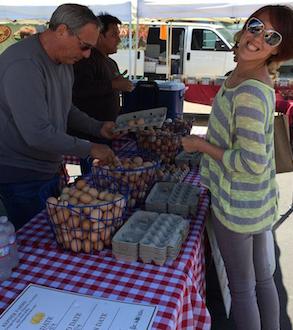
Kepner Farms sells eggs at the Manhattan Beach farmers’ market. (photo courtesy Carl Kepner/Kepner Farms)
Near Lake Elsinore, California, a former dude ranch is now home to pastured lamb and poultry.
Its transformation began when Carl Kepner inherited the land in 2010 and began Kepner Farms. It took some trial and error, however, for the business to arrive at its current incarnation.
Kepner started with aquaponics, and by 2012 was selling agricultural products. But he did not like the overall performance he was getting through his aquaponics operation, and switched over to traditional planting.
“I like soil better,” he says.
But realizing that growing fruits and vegetables was too labor-intensive for his liking and wanting to make permaculture a central theme of his operation, Kepner decided to raise pastured lambs and chickens. Now, Kepner Farms features 2,000 chickens and 250 head of sheep and lambs. Read More
Diversification, Organic Growing, and Savvy Enable Riverside Family to Save Farm and Prosper
April 20, 2016 | AJ Hughes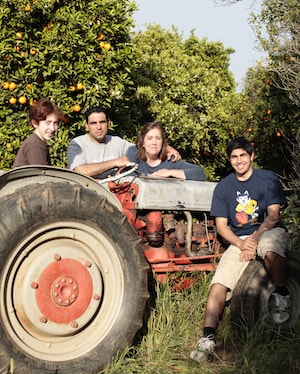
Hassan and Deborah Ghamlouch, along with their two sons, Zachary and Jacob, run The Grove, an organic family farm in Riverside, CA. (photo courtesy Hassan Ghamlouch/The Grove)
The Grove, a diversified and certified-organic family farm in Riverside, CA used to grow only citrus fruit and avocados. But in order to survive a changing market, it has diversified to include a wide array of organic produce.
Hassan Ghamlouch and his wife, Deborah, have operated The Grove for more than 13 years. Their sons Zachary and Jacob are also key contributors to the operation.
The farm has been in the family for four generations, dating back to the late nineteenth century when it primarily produced navel oranges. When Deborah’s parents wanted to sell the farm in the early 2000s, she and Hassan decided to purchase it and take over. They based their decision partly on the fact that The Grove’s orange trees are part of the original rootstock planted well over 100 years ago.
But Hassan and Deborah knew that if they wanted to keep the farm in their family, drastic changes were inevitable and necessary. Read More


